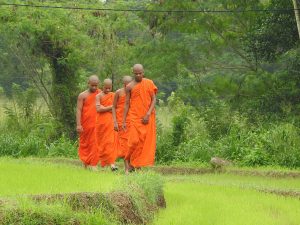Although Sri Lanka suffered decades of violent ethnic conflict, Sri Lankans seem to have positive attitudes toward people of other religions – despite the fact that most see religion as key to their Sri Lankan identity.
A new Pew Research Center report titled “Buddhism, Islam and Religious Pluralism in South and Southeast Asia” found that 62 percent of Sri Lankans surveyed for the study expressed positive sentiments about religious, ethnic, and cultural diversity.
The study also found that 95 percent of Buddhists believe that being Buddhist is integral to being truly Sri Lankan. Beyond a religious label, Buddhism is often seen as a cultural and family tradition that one must uphold in Sri Lanka.
Sri Lankans are not averse to having people of other religions living near them. Of Sri Lankan Buddhists, 81 percent reported they are willing to have Hindu neighbors, 82 percent are willing to have Christian neighbors, and 75 percent are willing to have Muslim neighbors. and 85 percent of Sri Lankan Hindus feel the same way about Buddhists.
However, the survey also suggests that many respondents see non-Buddhists as not fully Sri Lankan. Only 50 percent of Sri Lankans view Islam as “compatible with their country’s culture and values,” as opposed to 68 percent having the same view of Hinduism and Christianity.
A multi-ethnic, multi-religious, and multi-lingual country, Sri Lanka is largely Buddhist, with Buddhists accounting for 70.2 percent of the population. Hindus, Muslims, and Christians comprise 12.6, 9.7, and 7.4 percent of the population respectively.
In ethnic terms, Sri Lanka is overwhelmingly Sinhalese (74.9 percent) and most Sinhalese profess the Buddhist faith. Tamils, who are the largest minority, are mainly Hindu but a sizeable number are Christian. Unlike the Sinhalese and Tamils, whose identity is largely determined by ethnicity, religion determines the identity of Sri Lankan Muslims, who speak Sinhala or Tamil depending on where they live.
The Pew study explored respondents’ openness to pray to deities of other faiths. In Sri Lanka, 39 percent of Buddhists said they also pray or offer their respects to Allah, with 57 and 84 percent praying to Jesus and Ganesh respectively. On the other hand, 71 percent of Sri Lankan Muslims said they prayed to Buddha, with 69 and 62 percent also praying to Jesus and Ganesh. Meanwhile, 71, 55, and 84 percent of Sri Lankan Hindus surveyed said they pray or offer their respects to Buddha, Allah, and Jesus respectively.
This is not the trend in other countries surveyed for the Pew study. Only 2 percent of Buddhists in Cambodia said they prayed to Allah, with 6 and 4 percent also praying to Jesus and Ganesh. Only 1 percent of Muslims in Indonesia prayed or offered their respects to Buddha, Jesus or Ganesh.
While Sri Lankans seem to support religious diversity, the country has a history of inter-ethnic violence. Some governments have tried to come up with policies and initiatives to build harmony among people. On the other hand, there are political parties, including those that are multi-ethnic and multi-religious, which have sought to ride to power by appealing to ethnic and religious chauvinism.
While the Sri Lankan constitution does not describe the Sri Lankan state as a Buddhist one, it prioritizes Buddhism and guarantees state protection for Buddhism. Buddhism must remain “in the foremost place” and governments must “foster and cherish” Buddhism, it says.
In recent years, proponents of secularism have been calling for amendment of articles in the constitution that prioritize and protect Buddhism. Such calls have triggered an enormous public backlash.
The Pew report found that 80 percent of Buddhists in Sri Lanka support “basing national laws on Buddhist teachings and practices.” This explains why all governments and mainstream political parties have been reluctant to change Buddhism’s status in the Sri Lankan constitution.
When it comes to the involvement of religious leaders in public affairs, 66 percent of Sri Lankan Buddhists are of the view that religious leaders should have the right to vote in political elections. However, only 28 percent of them want monks to talk about the politicians or political parties they support. Only 22 percent express support for religious leaders engaging in political protests and 17 percent approve of monks pursuing political careers themselves.
Almost all Sri Lankan political parties have a bhikku (monk) wing, and often senior monks openly support political parties. In recent years, posts on social media have called for Buddhist monks to remain apolitical and transcend party politics when it comes to matters of national importance.
The Pew study shows that monks engaging in party politics is widely unpopular. This should give political parties and firebrand monks reason to pause and reconsider their strategies of courting them for support.
Unlike in the other countries surveyed where religious commitment declines with education and urbanization, in Sri Lanka there is no link between these factors.
In Sri Lanka, 90 percent of the educated and 96 percent of the less educated accord importance to religion. Meanwhile, 92 percent of rural Sri Lankans and 94 percent of city dwellers think religion is important.
In Sri Lanka most Buddhists express concerns about extremist elements within their faith. According to the survey, 75 percent of Sri Lankan Buddhists say that extremists from their own religion are a threat to Buddhism in Sri Lanka.

































